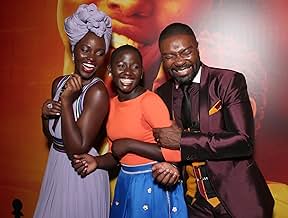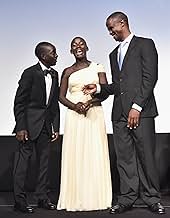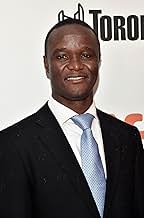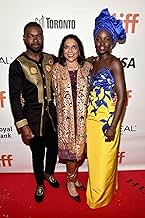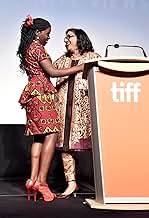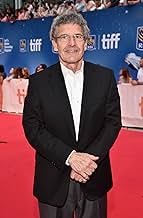AVALIAÇÃO DA IMDb
7,4/10
20 mil
SUA AVALIAÇÃO
Uma garota de Uganda vê seu mundo mudar rapidamente depois de conhecer jogo de xadrez.Uma garota de Uganda vê seu mundo mudar rapidamente depois de conhecer jogo de xadrez.Uma garota de Uganda vê seu mundo mudar rapidamente depois de conhecer jogo de xadrez.
- Direção
- Roteiristas
- Artistas
- Prêmios
- 4 vitórias e 30 indicações no total
Taryn Kyaze
- Night
- (as Taryn "Kay" Kyaze)
Esteri Tebandeke
- Sara Katende
- (as Esther Tebandeke)
Minky Ndlovu
- Man on Boda
- (as Nhlahla "Minkey" Ndlovu)
- Direção
- Roteiristas
- Elenco e equipe completos
- Produção, bilheteria e muito mais no IMDbPro
Avaliações em destaque
Mira Nair returns to Uganda once again, three decades after she made Mississipi Masala. This is a much better film. While Mississipi Masala centered around an upper middle class Indian-Ugandan family, Queen of Katwe is set in the slums of Uganda. Nair doesn't attempt to go easy on the slum visuals here. The filth and squalor are in your face here, from beginning to end. I haven't seen a film depicting poverty in this way for a long time. Even Slumdog Millionaire wasn't so strong. Otherwise Queen of Kawate is a fairly predictable story of an under-privileged girl rising to success against the odds. The medium of her rise is chess. She's the pawn who turns into a queen, as sometimes happens in chess. The performances are uniformly good, especially given that most of them are child actors (Mira Nair's first film was Salaam Bombay and she is pretty good at handling children). I found the end credits rather moving, where the real characters pose with the actors who played them on screen. All in all a very warm, watchable film.
Queen of Katwe goes far beyond the usual cliché movie: underdog overcomes adversity to win championship. Here, wonderful actors depict real people struggling with the realities of their lives: single motherhood, overcoming poverty, feeling out of place, and the challenges of playing high level chess. Particularly compelling is the story of Phiona's mother who lost her husband and struggles to provide for four children by selling cooked maize in the market. The actress who portrays her depicts her strength, and also her limitations with integrity. A wonderful performance. Of course, Phiona's story as a chess prodigy from the slums of Katwe, Uganda is harrowing, inspiring and insightful. The movie doesn't settle for a trophy as the outcome, focusing on the impacts on Phiona and her family along the way. The story of Phiona's coach is as inspiring as her story. His sacrifices, his wife's sacrifices and his challenges providing for his family as he tries to help the children of Katwe is a movie unto itself. That's why the whole thing is so satisfying. It is an amazing story of real people, only lightly changed for film-making, well acted and compelling.
Here is another beautiful film by Mira Nair who made 'Monsoon Wedding'. The cinematography captures the true colors and life in a slum of Uganda, Africa. The characters were really believable and the acting was excellent. Madina Nalwanga's acting was very convincing and true to her heart. She understands how to portray her emotions in front of the camera. The children in the film were brilliant and all the cast gave good performances. Some scenes were heartbreaking and moving. Mira Nair directs her actors with great skill and confidence which is visible on the screen. Its really beautiful to experience another culture and I was very happy to experience Uganda. A big congrats to Mira Nair for a good film. I met Mira Nair few years ago when she came to San Francisco for a film premiere. She was very nice and sweet lady.
I was hesitant to see the movie, although I marked it for my 2016 must watch list some time ago. There were things that discouraged me to prioritize this movie before all the other I have seen from 2016 so far - like its Disney poster, its genre of "from the bottom to the top" (always a danger to fall into clichés), and lack of exposure and reviews.
I am glad I finally watched it today, as it successfully managed to avoid clichés and 2D story-line so often seen in this genre and clichés of over-romanticizing of poverty and Africa in general. I think that the main reason this movie didn't succeed much in USA or Europe on commercial merit is that people didn't really get through those clichés yet. That, and perhaps the African accent that to some western ears may sound "too stupid and slow", so people often correlate that with intelligence of people who speak it.
For me, it was refreshing to see finally a good movie set out in Africa and even more so, I applaud the director's decision to shoot it in actual Katwe. It added up on the scale of authenticity and I bet it helped to facilitate actors performance as well- which is also on very high level. I especially liked Lupita Nyong'o's portrayal of the mother of Phiona - the main hero of the story. But surprisingly all child actors are really good too, even though most of them (I heard) never stood before camera (or maybe exactly because of that).
As I mentioned the story is classical "from the bottom to the top" genre, but what sets this movie apart from its stereotype genre is willingness to explore characters depth, and not only that of the protagonist (Phiona), but movie managed also to depict other characters with depth and I'd say there are three protagonists in this movie: Phiona (chess prodigy), her mother, and her coach Robert Katende. Story explores their limitations and strength, with nuance, character and intelligence. There are some beautiful scenes where characters above realize their own limitations and as they try to find the way to support each other's strength despite their embarrassment. So mainly this emotional intelligence and nuance set the movie apart from clichés of its genre.
Also there are many subtle references to class prejudices in Uganda (which, I think, people from every country can relate to). So bonus point for that too. We saw not just poor slums of Uganda - the dirt, poverty and tacit acceptance of it, we also saw middle class Uganda and upper rich class of Western-like style of Uganda. It was all too familiar to watch the power relations withing Uganda, although with different colour and context.
All in all, a story that deserved to be told. I thought it's impossible to make a movie about chess, but this movie kind of made me thinking about learning it! And all in all, a movie that deserves to be watched and acknowledged.I definitely liked it a lot and even managed to shed a tear here and there! I also liked the final credits where you could see the actors standing besides the real people they portrayed in the movie.
I am glad I finally watched it today, as it successfully managed to avoid clichés and 2D story-line so often seen in this genre and clichés of over-romanticizing of poverty and Africa in general. I think that the main reason this movie didn't succeed much in USA or Europe on commercial merit is that people didn't really get through those clichés yet. That, and perhaps the African accent that to some western ears may sound "too stupid and slow", so people often correlate that with intelligence of people who speak it.
For me, it was refreshing to see finally a good movie set out in Africa and even more so, I applaud the director's decision to shoot it in actual Katwe. It added up on the scale of authenticity and I bet it helped to facilitate actors performance as well- which is also on very high level. I especially liked Lupita Nyong'o's portrayal of the mother of Phiona - the main hero of the story. But surprisingly all child actors are really good too, even though most of them (I heard) never stood before camera (or maybe exactly because of that).
As I mentioned the story is classical "from the bottom to the top" genre, but what sets this movie apart from its stereotype genre is willingness to explore characters depth, and not only that of the protagonist (Phiona), but movie managed also to depict other characters with depth and I'd say there are three protagonists in this movie: Phiona (chess prodigy), her mother, and her coach Robert Katende. Story explores their limitations and strength, with nuance, character and intelligence. There are some beautiful scenes where characters above realize their own limitations and as they try to find the way to support each other's strength despite their embarrassment. So mainly this emotional intelligence and nuance set the movie apart from clichés of its genre.
Also there are many subtle references to class prejudices in Uganda (which, I think, people from every country can relate to). So bonus point for that too. We saw not just poor slums of Uganda - the dirt, poverty and tacit acceptance of it, we also saw middle class Uganda and upper rich class of Western-like style of Uganda. It was all too familiar to watch the power relations withing Uganda, although with different colour and context.
All in all, a story that deserved to be told. I thought it's impossible to make a movie about chess, but this movie kind of made me thinking about learning it! And all in all, a movie that deserves to be watched and acknowledged.I definitely liked it a lot and even managed to shed a tear here and there! I also liked the final credits where you could see the actors standing besides the real people they portrayed in the movie.
Mira Nair previously focused on Uganda in 1991's "Mississippi Masala" (about an Indian family forced into exile by Idi Amin). "Queen of Katwe" is the true story of Phiona Mutesi, who started playing chess to get out of Kampala's slums. Katwe is the sort of place where you have to bribe people to do even minimal tasks. Lupita Nyong'o plays Phiona's mother, the sort of person who knows the slums all too well and isn't thrilled with her daughter's goal.
One of the most effective scenes is when the Katwe children compete against the students of King's College: the Katwe children wear the traditional Ugandan attire while the rich children wear western clothes, showing the disconnect between the social classes (a scene towards the end of "Mississippi Masala" showed something similar: when the father returns to Uganda, he looks westernized while the Ugandans wear the traditional clothes).
Admittedly, I don't know how accurate the movie is, especially since I had never heard of the story before the movie's release. Nonetheless, it's a powerful, uplifting story. The people involved in this movie deserve ample recognition for their contributions, and I hope that it draws more attention to Phiona Mutesi's achievements.
One of the most effective scenes is when the Katwe children compete against the students of King's College: the Katwe children wear the traditional Ugandan attire while the rich children wear western clothes, showing the disconnect between the social classes (a scene towards the end of "Mississippi Masala" showed something similar: when the father returns to Uganda, he looks westernized while the Ugandans wear the traditional clothes).
Admittedly, I don't know how accurate the movie is, especially since I had never heard of the story before the movie's release. Nonetheless, it's a powerful, uplifting story. The people involved in this movie deserve ample recognition for their contributions, and I hope that it draws more attention to Phiona Mutesi's achievements.
Você sabia?
- CuriosidadesDirector Mira Nair decided to adapt "Queen of Katwe" into a film after making a documentary about the life of the man who trained Phiona Mutesi, Robert Katende.
- Erros de gravaçãoAll the end games of chess shown, but one, are a checkmate, something which hardly ever happens once players have acquired some experience. The one exception is when Phiona resigns a game which is treated as a personal crisis, when in fact it's normal to resign from hopeless positions - especially when playing with the black pieces, for this brings the disadvantage of not making the first move.
Never seen in the movie are any games ending with a draw, which in chess is extremely common.
- Citações
Robert Katende: [Robert speaking to Phiona] Sometimes the place you are use to... is not the place where you belong
- Cenas durante ou pós-créditosJust before the credits, there are short scenes of the major characters with the real people they portrayed. A brief synopsis of what the real people have done since the events of the film and are doing at the time of the film's completion is displayed as well.
- Trilhas sonorasNdi Muna Uganda
Written by Bobi Wine
Performed by Bobi Wine feat. Nubian Lee
Courtesy of Fire Base Records
Principais escolhas
Faça login para avaliar e ver a lista de recomendações personalizadas
- How long is Queen of Katwe?Fornecido pela Alexa
Detalhes
- Data de lançamento
- País de origem
- Central de atendimento oficial
- Idioma
- Também conhecido como
- Reina de Katwe
- Locações de filme
- Kampala, Uganda(Slums of Katwe)
- Empresas de produção
- Consulte mais créditos da empresa na IMDbPro
Bilheteria
- Orçamento
- US$ 15.000.000 (estimativa)
- Faturamento bruto nos EUA e Canadá
- US$ 8.874.389
- Fim de semana de estreia nos EUA e Canadá
- US$ 304.933
- 25 de set. de 2016
- Faturamento bruto mundial
- US$ 10.368.126
- Tempo de duração2 horas 4 minutos
- Cor
- Mixagem de som
- Proporção
- 2.39 : 1
Contribua para esta página
Sugerir uma alteração ou adicionar conteúdo ausente









